Washington speeds up collision course with Europe over Iran
Finian Cunningham (born 1963) has written extensively on international affairs, with articles published in several languages. Originally from Belfast, Ireland, he is a Master’s graduate in Agricultural Chemistry and worked as a scientific editor for the Royal Society of Chemistry, Cambridge, England, before pursuing a career in newspaper journalism. For over 20 years he worked as an editor and writer in major news media organizations, including The Mirror, Irish Times and Independent. Now a freelance journalist based in East Africa, his columns appear on RT, Sputnik, Strategic Culture Foundation and Press TV.
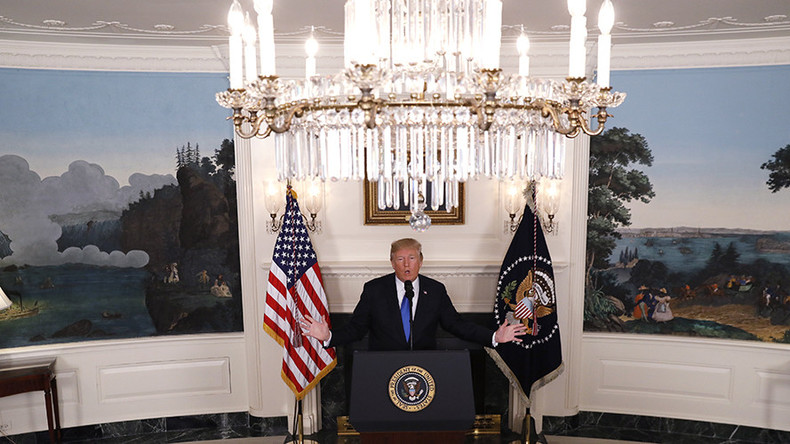
The Trump administration is accelerating on a collision course with its European allies over the Iran nuclear deal. Washington is essentially demanding the EU joins in backdoor sanctions against Iran – or face financial penalties. In short: browbeating, arm-twisting, and bribery.
In a sign of the times, the Europeans are resisting American pressure. With huge investments already lined up between EU countries and Iran, the Trump administration is being viewed with contempt for daring to bully European economic interests.
In a classic backfire, Washington’s browbeating of European allies is pushing them to reorient their strategic interests toward China, Russia and a multilateral global order in which US power diminishes even further.
Earlier this week, US Secretary of State Rex Tillerson gave an extraordinarily explicit warning to Europe over Iran. At a news conference in the Saudi capital, Riyadh, Tillerson said European companies are “at great risk” if they invest in Iran owing to the Trump administration possibly re-imposing sanctions on Tehran in the coming months.
Trump’s dangling of sanctions follows his “decertification” earlier this month of the international nuclear accord signed with Iran and five other world powers: Russia, China, Britain, France, and Germany. Known formally as the Joint Comprehensive Plan of Action (JCPOA), the July 2015 deal promised to lift trade sanctions on Iran in exchange for the latter’s restriction on its nuclear energy program to prevent any weaponization.
Washington’s repudiation of the JCPOA is not shared by the Europeans, Russia nor China. The UN nuclear watchdog, the International Atomic Energy Agency, has also confirmed that Iran is in full compliance with the terms of the accord. EU leaders and diplomats have adamantly said they have no intention of abandoning the agreement or renegotiating it. China and Russia likewise concur.
From the early days of Trump’s presidency, he has been griping about the Iran deal, calling it the “worst ever.” He and others in Washington claim Iran is using sanctions relief to finance support for Syrian ally Bashar Assad, Lebanon’s Hezbollah movement and clandestine terror operations in the Middle East. Washington’s claims are invariably vague and unsubstantiated. Tehran has dismissed Trump’s accusations as ignorant.
Evidently, the Europeans do not have the same pejorative view of Iran as a “global sponsor of terrorism” as the Americans. Neither does China or Russia. Even before Trump decertified the JCPOA – a move which could trigger a full-blown cancellation after a Congressional review requested by the president – there was already talk about Washington and Europe clashing. “Europe and the USA on collision course,” ran a headline in Deutsche Welle in August.
Now, after Tillerson’s pointed warning to the Europeans to “stay out of Iran,” the US is ramping up the clash. Bloomberg headlined last week: “Trump’s Iran policy is a headache for EU business.” The report noted, however, that: “America’s U-turn on nuclear accord won’t spike existing [European investment] deals.”
Since the signing of the JCPOA two years ago, European investment and trade with Iran have burgeoned. For example, French oil major Total earlier this year finalized a 20-year oil and gas project worth around €5 billion, along with a Chinese firm.
That followed the announcement of multi-million euro investment plans by car manufacturers Renault and PSA (Peugeot and Citroen) to expand factories in Iran. This month, only days after Trump announced he was decertifying the JCPOA, a Norwegian-led consortium signed a €3 billion project with Iran to build solar panels for the international market. “Norway is fully committed to the JCPOA,” said the Norwegian ambassador to Iran.
Germany and France have both seen exports to Iran rapidly multiply. The German chamber of commerce expects total bilateral commerce to double in the next two years. Next month, the EU’s foreign policy chief Federica Mogherini is to travel to Washington where she will reiterate the bloc’s resolute support for the nuclear accord. Last week, Mogherini made the case that Europe must now take global leadership. She didn’t mention Trump by name, but it was clear she was rebuking Washington’s isolationist policy.
Germany’s Foreign Minister Sigmar Gabriel has also berated Washington’s bullying tactics over Iran. Gabriel said Trump was inevitably pushing Europe toward consolidating economic interests with China and Russia.
Following Tillerson’s lecturing to the EU earlier this week about not investing in Iran, the New York Times reported: “European diplomats have said they would defend their companies against such sanctions, potentially setting up an epic battle between close allies and two of the largest commercial markets on the planet.”
This is the ineluctable thing. The Europeans have already committed enormous amounts of capital to developing trade and industry with Iran – a country that ranks in the global top five for oil and gas reserves. With a population of 80 million and a high standard of education, Iran promises to be a lucrative growth area. Even under decades of US-led sanctions, the country scored impressive achievements in development, innovation, and engineering.
Unlike the Europeans, the US has negligible commercial ties with Iran. It is therefore easy for Washington to threaten sanctions against that country. Washington has little to lose. Not so the Europeans. For the Trump administration to say that investments are “at risk” is therefore seen as an outrageous infringement on Europe’s future economic plans.
As France’s Finance Minister Bruno Le Maire told American officials ahead of Trump’s expected knock-back to the Iran deal: “The US must not appoint itself as a global policeman." The irony is that Washington’s overweening attitude toward its European “allies” is likely to hasten the global dynamic it most fears. That is the decline of American economic power and the rise of a multipolar global order.
Former US President Jimmy Carter acknowledged the shift when referring to North Korea this week and the need for diplomacy. He said the US was “no longer dominant” and that “Russia was coming back, and China and India were coming forward.”
The once-mighty American dollar is increasingly challenged in its status as the world’s top reserve currency. China is moving to a gold-backed yuan payments system for its imports and exports. Russia is stockpiling gold reserves, in another move which is seen as Moscow making preparations for a break with the US-dominated financial order.
Washington still retains tremendous control over international banking and finance. It has veto power at the International Monetary Fund, and it dominates the SWIFT banking system for payments.
Nevertheless, nothing remains forever. China and Russia are making strides toward economic life without the dollar. The Europeans already have a reserve currency with the euro. If push comes to shove, the EU could conduct its business with Iran and let the Americans go hang. With China and Russia already forging ahead on a new multipolar global order, the Europeans might soon realize that their best interests are served from breaking away from Washington’s shadow.
It is increasingly apparent especially under Trump that American interests are colliding with those of European “allies.” In the end, it comes down to the exigency of self-interest. Europe is finding it simply can’t afford America’s stupid arrogance. Washington’s hectoring of allies is digging its own grave as a global power.
The statements, views and opinions expressed in this column are solely those of the author and do not necessarily represent those of RT.
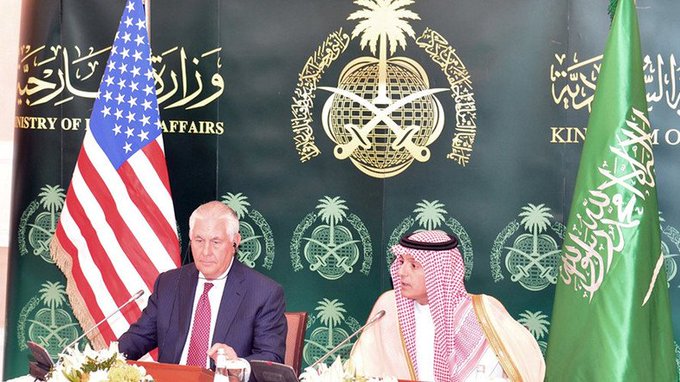
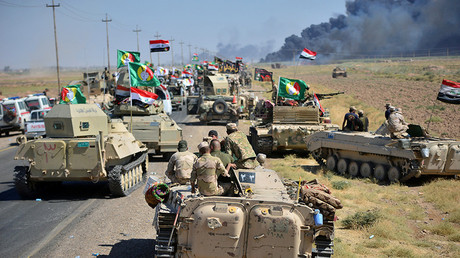
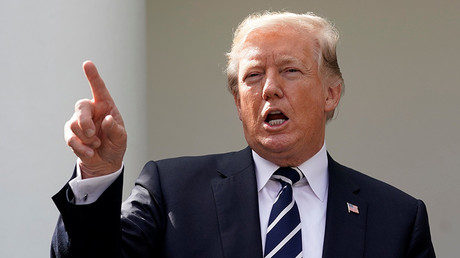
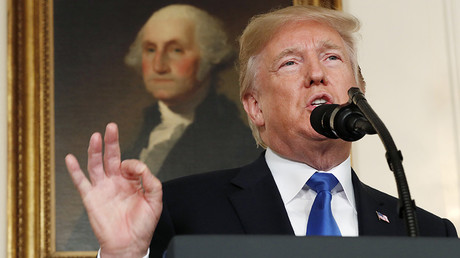

0 Comments:
Post a Comment
Subscribe to Post Comments [Atom]
<< Home